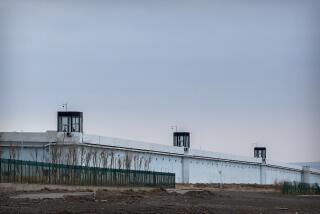China Accused of Reneging on Rights Pledge
- Share via
BEIJING — Amnesty International said Thursday that the Chinese government had not lived up to its assurances that human rights in the country would improve after Beijing’s selection as host of the 2008 Olympic Games.
The London-based human rights group cited a list of abuses in China, including frequent use of the death penalty, numerous cases of arbitrary detention, persecution of civil rights activists and censorship of the media and the Internet.
“With just two years to go until the Olympic Games take place in Beijing, the Chinese authorities are failing to meet the human rights commitments they made when Beijing was awarded the Olympics in April 2001,” the group said in a report. “Serious human rights violations continue to be reported across the country, fueling instability and discontent.”
Beijing, which is investing billions of dollars to build infrastructure for the Olympics and to bolster its international prestige, called the report inaccurate and politically motivated.
“Amnesty International is biased on issues related to China,” Chinese Foreign Ministry spokesman Qin Gang said at a regular news briefing Thursday. “It says that China vowed to protect human rights only so it can get to host the Olympics.
“The reality is China has been reforming all along, developing its economy and building a more humane, civil and law-abiding society. We have every confidence that we have the ability to host a successful Olympics.”
During the bidding process for the Olympics in 2001, Beijing officials told the International Olympic Committee that allowing China to hold the Games could help the country improve human rights by spurring development.
China has opened its economy and allowed citizens more personal freedom than the previous generation enjoyed. But uneven development and a growing wealth gap have given rise to widespread social discontent and protests.
The fear of instability has prompted the government in recent years to intensify its crackdown on dissent. The Olympics has become an opportunity for the country to showcase its progress, but critics say it may be used to justify a return to past methods of control.
In the name of making the Olympics safer, Beijing decided in May to use the country’s “reeducation through labor” camps to clean up the capital, Amnesty International said. People could be held for offenses that include unlawful advertising or leafleting, unlicensed taxis, unlicensed businesses, vagrancy and begging, the group said.
Amnesty International said the system was used to detain people for one to three years, without charge, trial or judicial review.
Last week, Beijing officials discussed the possibility of putting all mentally ill people into hospitals during the Olympics, Chinese media reported. The estimated 1 million migrant workers toiling in the city, many on Olympics-related projects, also could get the boot to avoid unpleasant run-ins with foreign tourists.
Some Beijing residents have been forced from their homes to make way for construction projects tied to the Games.
Activists trying to help residents fight for their rights have been severely punished, Amnesty International said.
The group cited the case of Ye Guozhu, who tried to organize a demonstration of Beijing tenants. He is serving a four-year sentence for allegedly “picking quarrels and stirring up trouble,” the report said. While in prison, he was allegedly suspended from the ceiling by his arms and beaten. When he refused to admit guilt, he was hit with electro-shock batons, Amnesty International said.
Another activist, Qi Zhiyong, who lost a leg after being shot during the 1989 Tiananmen Square crackdown, was forced to move his small shop many times because of Olympics construction. He was detained for 51 days after participating in a hunger strike to protest beatings suffered by his supporters.
With numerous foreign journalists expected to descend on the Chinese capital for the Olympics, it would be difficult for the government to hide all the pockmarks. Although officials have vowed to guarantee freedom to foreign journalists, they have stepped up control over domestic media, jailing journalists and shutting down websites.
Amnesty International called on Beijing to end all such censorship activities, and asked the International Olympic Committee to help pressure the government to live up to its human rights promises.
An IOC spokeswoman said in Beijing that it was not the organization’s place to pressure governments, and that it was “premature,” two years before the Games, to say that China had failed to live up to its pledge.
More to Read
Sign up for Essential California
The most important California stories and recommendations in your inbox every morning.
You may occasionally receive promotional content from the Los Angeles Times.










